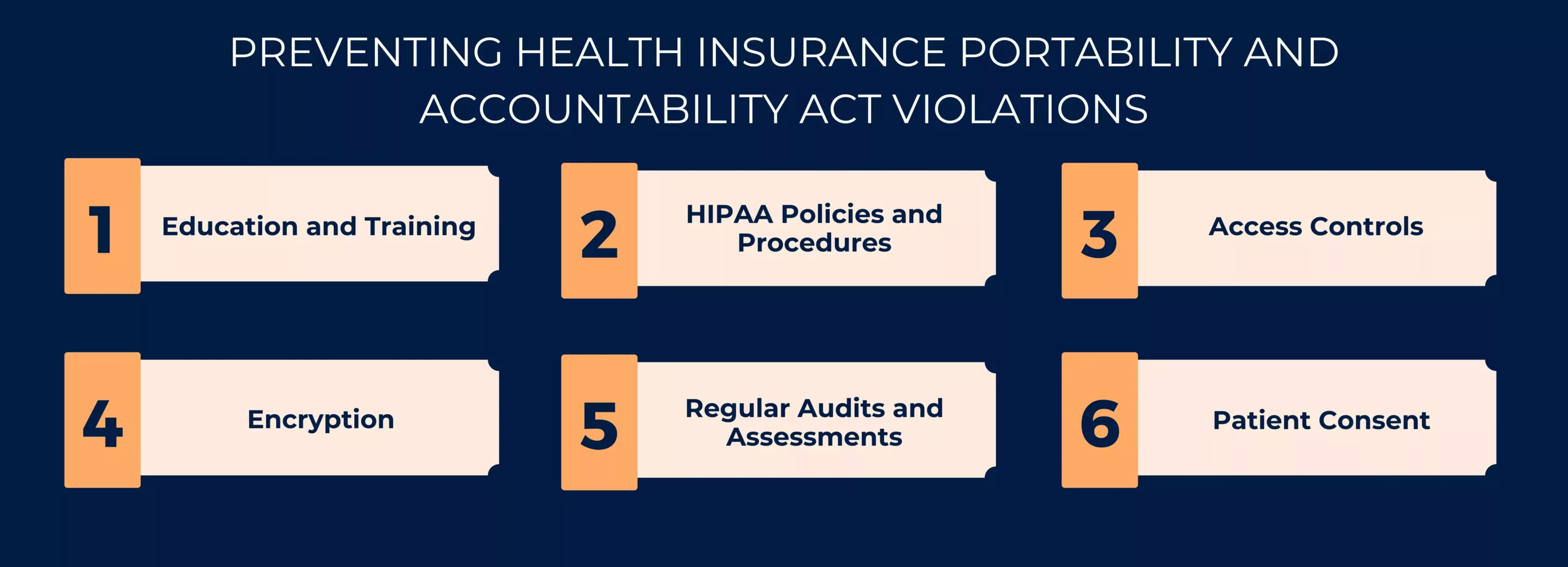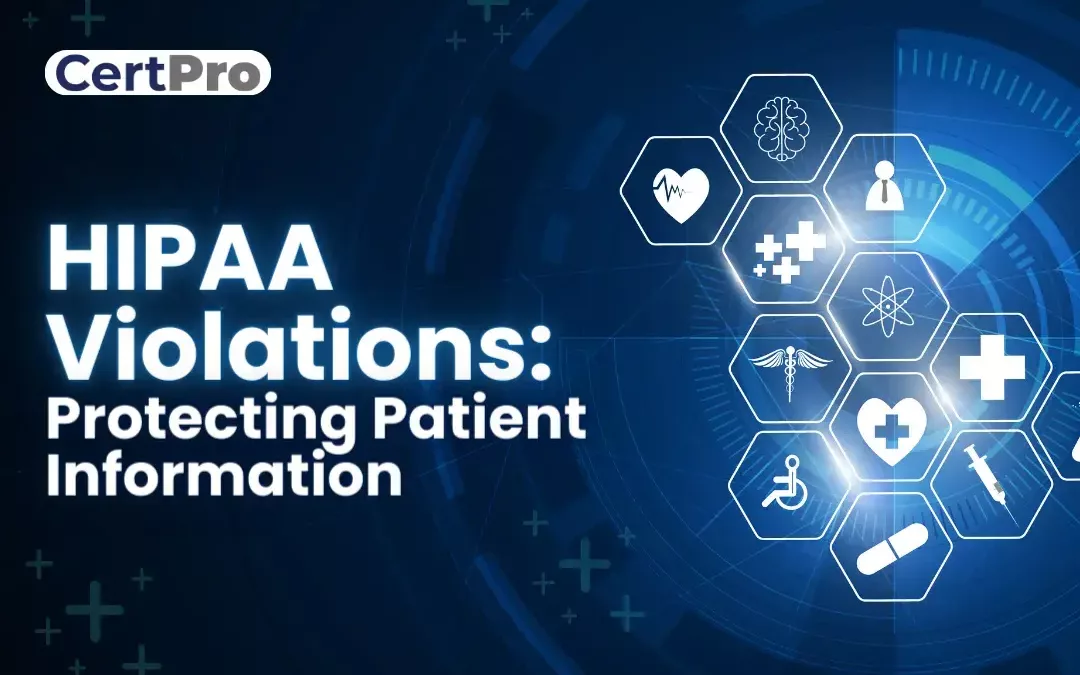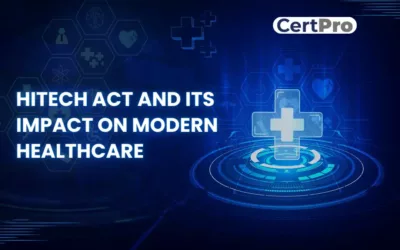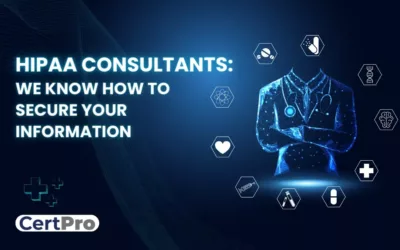In our rapidly evolving landscape of interconnected healthcare data systems, preserving patient privacy becomes increasingly critical. We delve deep into the Health Insurance Portability and Accountability Act (HIPAA), a pivotal legal framework meticulously crafted to guarantee the secrecy and protection of patient data. We closely examine HIPAA violations, highlighting their consequences and implications.
HIPAA lays down stringent protocols for safeguarding personal identification numbers, and other sensitive healthcare information. Throughout this discourse, we will underscore various avenues through which HIPAA violation penalties for employees, may occur, offering real-world instances that underscore the critical importance of adhering to these regulations. This article will also furnish practical guidance on how healthcare institutions, professionals, and individuals can avoid HIPAA violations reporting infractions.
This includes implementing robust data security measures, training staff and patients alike, and staying vigilant against potential HIPAA violations and their consequences. HIPAA is essential for patients who wish to understand their rights and the safeguards in place for their private medical information, as well as for healthcare organizations and professionals. This HIPAA review establishes the groundwork for a more in-depth investigation of each of its constituent parts, illuminating the crucial function it serves in preserving patient privacy and advancing the healthcare system.
OVERVIEW OF HIPAA
In the realm of healthcare and data security, grasping the significance of HIPAA (Health Insurance Portability and Accountability Act) is absolutely vital. Enacted in 1996, HIPAA stands as a robust fortress safeguarding the confidentiality and security of individuals’ personal health information within our increasingly digital and interconnected healthcare landscape.
At its core, HIPAA empowers individuals with control over their health data by imposing stringent regulations on how healthcare entities must collect, use, retain, and share this information. HIPAA violations attorney introduce the concept of protected health information (PHI), which encompasses a wide spectrum of patient data, including medical histories, test results, billing details, and more. These regulations span a broad range, encompassing secure electronic health record transfers and the proper disposal of medical records. The safeguarding of PHI is further fortified through the strict implementation of access controls, encryption protocols, and routine audits.
Consequences of HIPAA Violations
Health Insurance Portability and Accountability Act (HIPAA) infractions can have a range of negative effects on people and businesses. The following are a few significant effects:
1. Legal Consequences: There are both civil and criminal penalties for HIPAA infractions. If someone willfully and knowingly divulges protected health information, they may be subject to criminal penalties, such as imprisonment.
2. Lawsuits: Patients whose privacy has been violated as a result of a HIPAA violation lawsuit may sue the offending party. These cases may lead to monetary settlements and serious reputational harm.
3. Loss of Trust: A HIPAA violation might damage the trust between patients and healthcare providers. It can be difficult to rebuild trust once it has been lost, which could have an effect on a healthcare organization’s long-term success.
4. Reputational Damage: Healthcare providers, insurers, or other organizations may suffer significant reputational harm as a result of publicity surrounding a HIPAA breach. Loss of clients, partners, and income may result from this.
Corrective action plans can be required, involving significant investments of money and resources. Disciplinary proceedings, such as license revocation or loss of accreditation, may also be taken against healthcare providers and organizations. Data breaches require significant reporting and damage management, and increased scrutiny and audits by the Office for Civil Rights (OCR) can raise compliance expenses. The cumulative effects of these factors highlight how crucial HIPAA violations consequences are to protecting patient privacy and healthcare data.
Instances of HIPAA Violations
It’s important to look at some actual cases in order to comprehend the seriousness of HIPAA violations Examples:
1. Unauthorized Access: When a staff member has unauthorized access to a patient’s medical records, it is one of the most frequent HIPAA violations. For instance, a nurse who is intrigued might dig up a celebrity’s medical history.
2. Lost or Stolen Devices: A violation may occur if a laptop, tablet, or smartphone that contains patient data is taken or misplaced. There may be severe consequences if these gadgets are not properly encrypted or secured.
3. Improper Disposal: A breach can also occur when physical documents with patient data are disposed of improperly. For instance, without properly shredding medical records before disposing of them in a standard trash can,
4. Hacking and Data Breaches: Serious infractions include cyberattacks that compromise patient data. Health insurance provider Anthem experienced a data breach in 2015 that compromised around 79 million patient details.
5. Inadequate Training: Accidental violations of HIPAA violation penalties for employees may occur if staff members are not properly trained. An example would be a receptionist accidentally giving the wrong person a patient’s information over the phone.
Preventing Health Insurance Portability and Accountability Act Violations
In order to maintain the privacy and security of patient information, it is critical that HIPAA violations be avoided. Businesses, individuals, and healthcare facilities can take the following actions to reduce the risk of HIPAA violation consequences
1. Education and Training: Hold recurring HIPAA training courses for all personnel who deal with patient data. Make sure they are aware of the rules, the significance of protecting patient information, and the penalties for breaking them.
2. HIPAA Policies and Procedures: Create and implement thorough HIPAA rules and procedures that are specific to your organization’s requirements. These have to cover breach notification procedures as well as data access, storage, transport, and disposal.
3. Access Controls: Make sure that only authorized workers have access to patient records by implementing stringent access restrictions and user authentication procedures. Review and modify access permissions as necessary on a regular basis.
4. Encryption: To prevent unwanted access to sensitive information, especially when it is being transferred or kept on mobile devices or in the cloud, encrypt electronic health records and other types of sensitive data.
5. Regular Audits and Assessments: To find weaknesses and areas of non-compliance, conduct routine internal audits and security assessments. Address any problems right away.
6. Patient Consent: Obtain informed consent from patients before using their data for any purpose not directly related to their healthcare, such as research or marketing.

CERTPRO : Your Trusted Partner in Ensuring HIPAA Compliance
Protecting patient data is more important than ever at a time when data breaches loom large. Health care providers, businesses, and individuals are required to adhere to the strictest privacy and data security standards under the Health Insurance Portability and Accountability Act (HIPAA). At CertPro, we understand the critical relevance of HIPAA compliance and the safeguarding of private patient information.
HIPAA infractions carry serious penalties, including hefty fines, the possibility of criminal prosecution, and permanent reputational harm. To make sure that your company is completely compliant with HIPAA violation examples, our experienced team develops complete strategies, performs in-depth audits, and provides rigorous training. You can easily handle the challenges of healthcare data security with CERTPRO as your dependable ally. We recognize that protecting patient information goes beyond merely being required by law and is a moral imperative that supports public confidence in the healthcare industry.
FAQ
What is protected health information (PHI)?
A covered entity or business associate considers any individually identifiable health information that they keep or manage as protected health information (PHI). A patient’s medical history, treatment logs, billing data, and any other details that can be used to identify the person can all be included in this information.
What are some common examples of HIPAA violations?
Unauthorized access to patient records, the sharing of PHI without patient authorization, the incorrect disposal of medical records, data breaches as a result of hacking or theft, and the failure to safeguard electronic health records (EHRs) are common examples of violations of HIPAA.
How should healthcare organizations report HIPAA?
A HIPAA compliance officer should be assigned to healthcare organizations. Employees should report violations to this official internally. Patients can file complaints with the Office for Civil Rights (OCR) of the U.S. Department of Health and Human Services (HHS) if they feel their privacy has been violated.
How can healthcare organizations prevent HIPAA violations?
Strong procedures and policies must be established, employees must receive ongoing HIPAA training, electronic medical records must be safeguarded, risk assessments must be carried out, and compliance must be regularly audited. The business must also cultivate a strong culture of security and privacy.
How can healthcare professionals protect patient information on a daily basis?
By adhering to stringent procedures for accessing and exchanging PHI, using secure communication channels, preserving the physical security of medical records, and being watchful of privacy and security standards in their daily activities, healthcare workers may protect patient information.

About the Author
SHREYAS SHASTHA DRUPADHA
Shreyas Shastha Drupadha, a Senior Business Consultant. Serving as an ISO 27001 Lead Auditor, Shreyas ensures the establishment of robust information security management systems. His expertise also encompasses GDPR, HIPAA, CCPA, and PIPEDA implementation.
HITECH ACT AND ITS IMPACT ON MODERN HEALTHCARE
In 2009, the Health Information Technology for Economic and Clinical Health or HITECH Act was signed to transform the American healthcare industry. The laws worked as a forward-thinking process of changing patient services. In this regard, the Patient Protection and...
BEST PRACTICES FOR DATA PROTECTION IN THE HEALTHCARE INDUSTRIES
In the healthcare sector, safeguarding sensitive information about patients is extremely important. Patient data includes personal details, medical histories, and treatment plans. Therefore, it must be protected and should be confidential. Thus, breaches not only...
HIPAA CONSULTANTS: WE KNOW HOW TO SECURE YOUR INFORMATION
Navigating HIPAA compliance can be complex; therefore, organizations seek advice from HIPAA consultants. These HIPAA experts have specific knowledge. They can help firms to understand the problematic standards of the Healthcare Privacy Act. In 1996, HIPAA was created....




